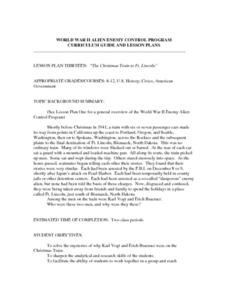Curated OER
What Makes a Good Law?
Why were laws created? Spark a group discussion on why we need laws to co-exist. Should the sale of some things be outlawed on Sundays? Read a case summary between Target and the state of Minnesota that debated this issue. Ask your...
Curated OER
The Changing Meaning of "Due Process"
Learners examine the United States Constitution and how the application for due process differs in two amendments. They research the changing definition of the term since the Civil War. They use the internet to research press coverage of...
Curated OER
What's the Difference Between Procedural and Substantive Due Process?
High schoolers discuss the difference between substantive and procedural due process. They research the uses of due process on the internet and books. They also discuss cases involving students and due process.
Curated OER
What is Due Process Anyway?
Students examine the term due process and its historical origins. They compare and constrast the requirements of due process in the United States Constitution and the Indiana Constitution. They also discuss the difference between...
Curated OER
Due Process - Search and Seizure
Help your 11th and 12th graders gain a deeper understanding of Supreme Court decisions and law. The activities include role-play, research, and script writing that all focus on search and seizure laws pertaining to one particular case...
Curated OER
Due Process Freedoms
Students participate in a simulation of the voir dire portion of a trial. There are student lawyers assigned for the prosecution and the defense. They must review and question all prospective jurors to obtain a fair and impartial jury.
Curated OER
U.S. History Worksheet #73
Explore how the 14th Amendment changed the way the United States operated, both politicallay and socially. In this United States history worksheet, students utilize a word bank of 10 terms or phrases to answer 10 fill in the blank...
Curated OER
Mapp v. Ohio (1961)
Students examine warrantless searches and due process. In this Supreme Court lesson plan, students examine primary documents from Mapp v. Ohio and discuss the implications of the decision.
Curated OER
Dred Scott v. Sandford
Students examine the issues of slavery and due process. In this Supreme Court lesson, students examine primary documents from Dred Scott v. Sandford and discuss the implications of the decision.
Curated OER
Gideon v. Wainwright
Students examine the right to counsel and due process. For this Supreme Court lesson, students examine primary documents from Gideon v. Wainwright and discuss the implications of the decision.
Curated OER
Miranda v. Arizona (1966)
Students examine Miranda v. Arizona. In this court decisions lesson, students analyze the self incrimination case and read other supplemental articles about police procedures and due process. Students discuss the Supreme Court decision...
Curated OER
A Simulated Journey
Fifth graders experience simulations in order to meet the required Social Studies standards. In this simulation instructional activity, 5th graders experience a teacher set-up simulation of students being put in the Responsible Thinking...
Curated OER
Fairy Tails Can Show Due:It can happen for you, If you play your part.,
Students view a Reader's Theater focusing on the story of Goldilocks and the Three Bears. The story is used as a springboard into a videotaped mock trial of Gold E. Locks developed by the American Board of Trial Advocates (ABOTA). They...
Curated OER
Ban on Same-Sex Marriage: Does it Violate 'Due Process' and 'Equal Protection'?
Students examine due process and equal protection. In this current events instructional activity, students read the provided article, "Due Process and Equal Protection for Gays and Lesbians." Students respond to the provided discussion...
Curated OER
Due Process
Young scholars explore the concept of due process. In this American law lesson plan, students view a 9-slide PowerPoint presentation on the topic and then respond to 3 discussion questions about the 5th and 14th amendments.
Curated OER
Teaching about Due Process of the Law
Students explore the Due Process Clause in the United States Constitution.
Curated OER
The Christmas Train to Ft. Lincoln
High schoolers solve the mysteries of why Karl Vogt and Erich Braemer were on the Christmas Train. They review the definitions of the terms constitutional, human rights, due process, discovery, and the writ of habeas corpus. They review...
Curated OER
"Martial Law in Hawaii After the Attack on Pearl Harbor"
Students explore the concepts of martial law, writ of habeas corpus, due process, discovery and human and constitutional rights during World War II. They assess the roles and responsibilities of government leaders and citizens during...
Curated OER
Due Process
Students understand the legal term "due process of law" and its historical origins. They discuss the requirements for "due process of law" in both the U. S. Constitution and the Indiana Constitution and how those rights are similar or...




















